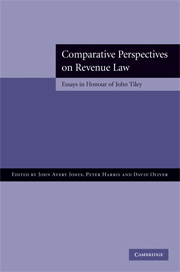Book contents
- Frontmatter
- Contents
- Contributors and affiliations
- Foreword by Dave Hartnett
- Foreword by Hugh Ault
- 1 A comparison of statutory general anti-avoidance rules and judicial general anti-avoidance doctrines as a means of controlling tax avoidance: Which is better? (What would John Tiley think?)
- 2 The judicial approach to avoidance: some reflections on BMBF and SPI
- 3 Comparing the application of judicial interpretative doctrines to revenue statutes on opposite sides of the pond
- 4 Abuse of rights and European tax law
- 5 The US legislative and regulatory approach to tax avoidance
- 6 The law of taxation and unjust enrichment
- 7 The history of royalties in tax treaties 1921–61: Why?
- 8 Land taxation, economy and society in Britain and its colonies
- 9 Meade and inheritance tax
- 10 Taxation, human rights and the family
- 11 Family connections and the corporate entity: income splitting through the family company
- Epilogue: Establishing the foundations of tax law in UK universities
- References
- Table of cases
- Table of abbreviations
- Index
2 - The judicial approach to avoidance: some reflections on BMBF and SPI
Published online by Cambridge University Press: 07 December 2009
- Frontmatter
- Contents
- Contributors and affiliations
- Foreword by Dave Hartnett
- Foreword by Hugh Ault
- 1 A comparison of statutory general anti-avoidance rules and judicial general anti-avoidance doctrines as a means of controlling tax avoidance: Which is better? (What would John Tiley think?)
- 2 The judicial approach to avoidance: some reflections on BMBF and SPI
- 3 Comparing the application of judicial interpretative doctrines to revenue statutes on opposite sides of the pond
- 4 Abuse of rights and European tax law
- 5 The US legislative and regulatory approach to tax avoidance
- 6 The law of taxation and unjust enrichment
- 7 The history of royalties in tax treaties 1921–61: Why?
- 8 Land taxation, economy and society in Britain and its colonies
- 9 Meade and inheritance tax
- 10 Taxation, human rights and the family
- 11 Family connections and the corporate entity: income splitting through the family company
- Epilogue: Establishing the foundations of tax law in UK universities
- References
- Table of cases
- Table of abbreviations
- Index
Summary
Introduction
More years ago that either us would probably wish to call to mind, John Tiley taught me matrimonial law at Cambridge. He was a new fellow at Queens' and as a then first year student at Sidney Sussex I have a favourable recollection of his lectures even though the elements of family law that he taught me have barely impinged upon my professional career (and thankfully not at all upon my private life).
In those days I suspect that neither of us knew more about tax than what little we gleaned from the leading cases that tax issues had provided in the field of equity and the law of trusts and in other branches of the law. At some stage, and no doubt by different means and for different reasons, we were both drawn into the murky and unprincipled world of taxation. From there Tiley has risen to become the UK's foremost tax law professor and I have had the great pleasure of coming to know him through our shared interest in the subject.
Within the tax field Tiley has sought in particular to cast light on the difficult topic of tax avoidance. Among his many contributions to the British Tax Review on that topic is an article on the development of the case law since Ramsay and a case note on what have become known as the BMBF and SPI cases.
- Type
- Chapter
- Information
- Comparative Perspectives on Revenue LawEssays in Honour of John Tiley, pp. 25 - 39Publisher: Cambridge University PressPrint publication year: 2008
- 1
- Cited by

